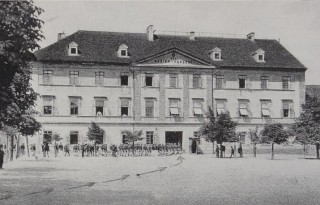
Mariánská kasárna in CB (Budweis). Until 1 June 1915 it was the home of the Good Soldier Švejk's Infanterieregiment Nr. 91. In 1915 Jaroslav Hašek also served with the regiment in these barracks.
The novel The Good Soldier Švejk refers to a number of institutions and firms, public as well as private. On these pages they were until 15 September 2013 categorised as 'Places'. This only partly makes sense as this type of entity can not always be associated with fixed geographical points, in the way that for instance cities, mountains and rivers can. This new page contains military and civilian institutions (including army units, regiments etc.), organisations, hotels, public houses, newspapers and magazines.
The line between this page and "Places" is blurred, churches do for instance rarely change location, but are still included here. Therefore Prague and Vienna will still be found in the "Places" database, because these have constant coordinates. On the other hand institutions may change location: Odvodní komise and Bendlovka are not unequivocal geographical terms so they will from now on appear on this page.
The names are colour coded according to their role in the plot, illustrated by these examples: U kalicha as a location where the plot takes place, k.u.k. Kriegsministerium mentioned in the narrative, Pražské úřední listy as part of a dialogue, and Stoletá kavárna, mentioned in an anecdote.
 Institutions index of institutions, taverns, military units, societies, periodicals ... (288)
Show all
Institutions index of institutions, taverns, military units, societies, periodicals ... (288)
Show all I. In the rear
I. In the rear  14. Švejk as military servant to senior lieutenant Lukáš (14)
14. Švejk as military servant to senior lieutenant Lukáš (14) II. At the front
II. At the front  1. Švejk's mishaps on the train (15)
1. Švejk's mishaps on the train (15) 2. Švejk's budějovická anabasis (38)
2. Švejk's budějovická anabasis (38) 3. Švejk's happenings in Királyhida (44)
3. Švejk's happenings in Királyhida (44) 4. New afflictions (26)
4. New afflictions (26)



|
I. In the rear |
 | |
13. Švejk goes to provide the last rites | |||
 | Vojenská nemocnice na Karlově náměstí |  | ||||
| Praha II./504, Karlovo námestí 39 | ||||||
| ||||||
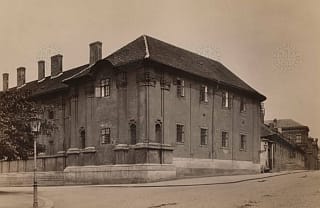
(11.6 1907) Pohled na nároží domu čp. 504 na Karlově náměstí (kolej novoměstských jezuitů - kasárna grenadýrů - vojenská nemocnice) na Novém Městě. Vpravo část ulice U Nemocnice.
© AHMP
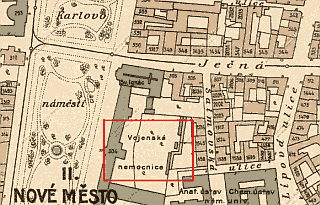
Vojenská nemocnice na Karlově náměstí was the destination of Švejk and Feldkurat Katz's mission to administer the last rites to the severely wounded.
Background
Vojenská nemocnice na Karlově náměstí (Military hospital at Charles square) refers to c.a.k vojenská nemocnice č. 11 (k.u.k. Militärspital Nr. 11) in Prague, a military hospital located at the southern end of Karlovo náměstí. Today the building is used by the university hospital (Všeobecná fakultní nemocnice v Praze).
A significant number of the locations mentioned in the first part of The Good Soldier Švejk and in anecdotes throughout the novel are located within 10 minutes walk from the hospital, including U kalicha. The author lived in this area for the first 20 years of his life, and frequently also later in life. He graduated both from gymnasium and the commercial academy only a few hundred metres from here.
The military hospital where Švejk spent time as a malingerer in [I.8] was a branch. See Vojenská nemocnice Hradčany.
Quote(s) from the novel
[I.13] Potom přečetl polní kurát ještě jednou předpis, ve kterém se mu oznamuje, že zítra má jít na Karlovo náměstí do Vojenské nemocnice zaopatřovat těžce raněné.
Also written:Military hospital at Charles squareenMilitärspital am KarlsplatzdeMilitærsjukehuset på Karlsplassenno
Literature
 | Kostel svátého Ignáce |  | ||||
| Praha II./505, Ječná ul. 2 | ||||||
| ||||||
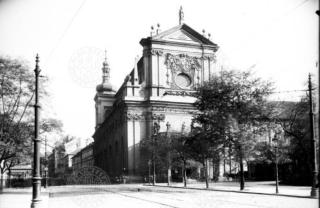
Pohled na kostel sv. Ignáce na Karlově náměstí, vpravo Ječná ulice. 24.10.1907.
© AHMP
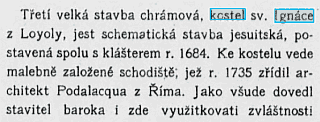
, 9.5.1913
Kostel svátého Ignáce is mentioned first time by Feldkurat Katz in a conversation with Švejk when he reveals that he many years ago performed a mass for military personnel here.
Later on the church appears in the description of Oberst Kraus and in the story about gas worker Zátka on the gas works at Letná [II.5] where Father Jemelka held a sermon.
The third mention is in an anecdote in the final chapter.
Background
Kostel svátého Ignáce is a church at the corner of av Ječná ulice and Karlovo náměstí which today serves as the main seat of the Jesuit order in Czechia. It is named after the founder of the order: Ignatius of Loyola. Construction started in 1665 and was completed in 1699.
Hašek and St. Ignatius
Jaroslav Hašek knew the church very well. Václav Menger tells us that he was ministrant (altar server) there during the 2nd last year at primary school (i.e. when he was around 9 years old). His knowledge of Catholic liturgy is no doubt in part due to this experience.
Quote(s) from the novel
[I.13] Znal tu pakáž, jak ji nazýval, z chrámu od Ignáce, když před léty tam míval kázání pro vojsko. Tenkrát ještě vkládal do kázání mnoho a „Sdružení“ sedávalo za plukovníkem.
[I.15] Byl při své tuposti neobyčejně nábožný. Měl doma v bytě domácí oltář. Chodil často ke zpovědi a k přijímání k Ignáci a od vypuknutí války modlil se za zdar zbraní rakouských a německých.
[II.5] A potom,“ řekl Švejk tiše, „to s tím Zátkou po čase skončilo moc špatně. Dal se do Mariánský kongregace, chodil s nebeskýma kozama na kázání pátera Jemelky k svatýmu Ignáci na Karlovo náměstí a zapomenul jednou zhasnout, když byli misionáři na Karláku u svatýho Ignáce, plynový svítilny ve svým rayoně, takže tam hořel po ulicích plyn nepřetržitě po tři dny a noci.
Credit: Václav Menger
Literature
- Jaroslav Hašek doma, ,1935
- Kostel sv. Ignáce,
 | Militärintendantur |  | ||||
| Praha III./258, Malostranské nám. 15 | ||||||
| ||||||
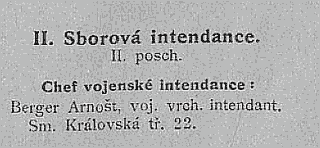
,1907

, 1914
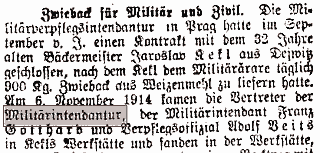
,8.1.1915
Militärintendantur is mentioned by Feldkurat Katz when he says that the army's administrative department apparently doesn't supply holy oil consecrated by a bishop.
Background
Militärintendantur was the administrative body of k.u.k. Heer who's task was to supply the army and perform accounting. The main office was located in Vienna, but here one no doubt refers to their branch by 8th army corps in Prague. The offices were located at the second floor of the Lichtenstein Palace in Malá Strana. See Korpskommando and k.u.k. Militärärar.
The army administrative authority is also the centre of a story by Jaroslav Hašek from 1910, Čáka pěšáka Trunce (The parade helmet of infantryman Trunec). Here it is the head office in Vienna that has to find suitable headgear for Trunec's enormous head. The main office was located in the building of k.u.k. Kriegsministerium to which it also reported.
Quote(s) from the novel
[I.13] Po těchto filosofických úvahách polní kurát umlkl a řekl: „Potřebujeme tedy olej posvěcený od biskupa. Tady máte 10 korun a kupte lahvičku. Ve vojenské intendantuře patrně takový olej nemají.“
Also written:Vojenská intendanturacz
Literature
- Čáka pěšáka Trunce, Jaroslav Hašek,12.10.1910
 | Firma Polák |  | ||||
| Praha I./1085, Soukenická ulice? 4 | ||||||
| ||||||

, 1910

,30.7.1914
Firma Polák was the paint store in Dlouhá třída where Švejk bought Hampseed oil no. 3 for use when giving the last rites. The store was most probably named after the owner. The employee who served the good soldier was Mr. Tauchen.
Background
Firma Polák has not been possibly to identify uniquely although the author locates it in Dlouhá třída. According to the address book of 1910 there was only one outlet in Dlouhá třída that corresponds to the description in the novel, but the owner was Ferdinand Adler. The shop was located in Dlouhá 732/39.
In Soukenická ul. 1085/4, 100 metres to the east, a firm A. J. Pollak had a shop that also traded in oils and paints. It is probably this establishment that the author had in mind as it was located at the western end of Soukenická where it joins Dlouhá. The proprietor in 1910 was Emil Pollak (1848-1914), a Jewish merchant.
The firm Jakub Pollak were located in Dlouhá no. 45 but they were book-binders and would therefore be an unlikely candidate.
Quote(s) from the novel
[I.13] V druhé chtěli telefonovat na ochrannou stanici a ve třetí mu řekl provisor, že firma Polák v Dlouhé třídě, obchod olejem a laky, bude mít rozhodně žádaný olej na skladě.
[I.13] Firma Polák v Dlouhé třídě byla opravdu firma agilní. Nepustila žádného kupce, aby neuspokojila jeho přání. Chtěl-li balsám kopaivu, nalili mu terpentýn a bylo také dobře.
[I.13] „Tak už máme volej,“ řekl slavnostně Švejk, když se vrátil od firmy Polák, „konopnej volej čís. 3, první kvality, můžeme s ním namazat celej batalion. Je to solidní firma. Prodává taky laky, fermež a štětce. Ještě potřebujeme zvoneček.“
Credit: Jaroslav Šerák
Literature
 | Sdružení šlechtičen pro náboženskou výchovu vojáků |  | ||||
| ||||||

Brünner Zeitung, 23.10.1899

,10.9.1903
Sdružení šlechtičen pro náboženskou výchovu vojáků was the Association of nobility ladies for the religious education of soldiers who were to be present when Feldkurat Katz administered the last rites at Vojenská nemocnice na Karlově náměstí the day after Švejk and he first visited. The association consisted of hysterical old ladies.
Background
Sdružení šlechtičen pro náboženskou výchovu vojáků has not been possible to identify. There is no such or similar organisation listed in the 1910 address book and is probably an invention by the author.
Still there existed other organisations where ladies from the nobility were involved, mainly within charitable work. This could be contributing funds for hospitals, support for war veterans, wounded soldiers, widows and orphaned children.
During the war newspapers and magazines often featured ladies from the nobility on hospital visits and it could have been these that inspired the author to write this passage (and the similarly themed visit of Baronesse von Botzenheim to Vojenská nemocnice Hradčany).
Quote(s) from the novel
[I.13] Potom přišel ordonanc a přinesl paket, ve kterém se polnímu kurátovi oznamuje, že zítra bude při zaopatřování v nemocnici přítomno Sdružení šlechtičen pro náboženskou výchovu vojáků.
Also written:Vereinigung adeliger Damen zur Pflege der religiösen Erziehung der SoldatenBrousekAssociation of Noblewomen for the Religious Education of SoldiersSadlon
Literature
 | U Křížků |  | |||||
| Karlín (?) | |||||||
| |||||||
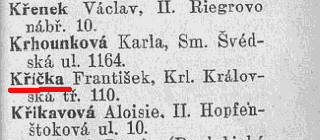
U Křížků is mentioned once because Švejk went here to steal a bell for the journey to give the last rites. It is also stated that it is a roadside inn and that Švejk was back in half an hour.
Background
U Křížků was a hospoda which is unclear where was located. The novel states that Švejk used half an hour to steal the bell so it must have been within easy walking distance from Karlín. The text of the novel limits it further: it was a zajezdní hospoda (roadside inn) so is likely to have been located on a former approach road.
The place that best fit these criteria is no doubt the pub of František Kříčka which in the address book of 1910 is listed as Královská třída 110. This is both on a main road and well within walking distance from Feldkurat Katz's flat. Named after the owners(s) it would have been called U Kříčky/U Kříčků, but this type of minor error is far from uncommon in The Good Soldier Švejk.
Jaroslav Šerák mentions five other alternatives but further away[a]. But it should be notet that neither Kříčka nor those five are listed as roadside inns in the address book, so could the autor have mixed it up with some other place? The roadside inn U města Hamburku, located on the same street, could be a candidate.
Quote(s) from the novel
[I.13] Obdržev svolení, Švejk přinesl za půl hodiny zvonek. „Je od vrat zájezdní hospody ,U Křížků,’“ řekl, „stál mne pět minut strachu a dlouho jsem předtím musel čekat, poněvadž se pořád trousili lidi.“
Literature
- Románové restaurační a jiné zábavní podniky, ,2009 - 2021 [a]
| a | Románové restaurační a jiné zábavní podniky | 2009 - 2021 |
 | Militärgeistlichkeit |  | |||
| Wien VIII., Skodagasse 19 | |||||
| |||||
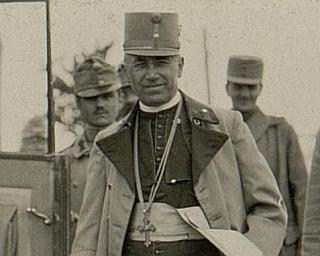
Besuch des Apostolischen Feldvikars Bjelik, 1916.

Zdeněk M. Kuděj
© LA-PNP
Militärgeistlichkeit is mentioned when Feldkurat Katz reads a directive from k.u.k. Kriegsministerium regarding restrictions on giving the last oil.
Later in the chapter the institution is referred to with contempt by the persistent money-lender when he complains to skriven about military clerics. Feldkurat Katz has just popped out to a café just as the money lender appears at the door to claim his dues.
Background
Militärgeistlichkeit (Military Clergy) was a collective term for the military clergy of Austria-Hungary. It included Catholic (the largest), Jewish, Greek-Orthodox, Muslim and Protestant. The institution reported to k.u.k. Kriegsministerium. To every division was assigned one divisional field chaplain and one field chaplain and each regiment was assigned one field chaplain. Serving in this role at Infanterieregiment Nr. 91 was Jan Eybl, he was at the regiment from 1 January 1914 to 24 April 1918.
Head of the military clergy from 1911 to 1918 was Emmerich Bjelik. His title was the resounding Apostolischer Feldvikar. Bjelik knew one of the models for figures in The Good Soldier Švejk, namely Ludvík Lacina. Another person who knew Bjelik was Zdeněk Matěj Kuděj who for a period served at the Feldvikariat in Vienna. It may well be that Jaroslav Hašek drew inspiration for some of his field chaplains from what Kuděj told him. The two authors met several times during the period the novel was written.
The institution of military clergy plays a prominent role in The Good Soldier Švejk and it is probably the authority that is subjected to the most stinging satire of them all. Already in [I.11] the author dedicates a complete sub-chapter to an attack on military clergy as a world phenomenon. Later the object of scorn is solely the Catholicy field clergy in Austria-Hungary. The field chaplains Katz, Martinec, Lacina and their pious colleague in [I.12] are either drunkards (and immoral) and those who are not soon slide into debauchery. Feldoberkurat Ibl is however only mentioned briefly, but as an idiotic preacher.
Lacina and to a lesser degree Feldoberkurat Ibl are both inspired by living persons - Ludvík Lacina and Jan Eybl respectively. Feldkurat Martinec and Feldkurat Katz have no obvious link to any existing persons and no field chaplains with these names are listed in Schematismus from 1914. The marginal Feldkurat Matyáš could however have been inspired by a real person. See Link A. Jaroslav Hašek definitely knew Eybl from his time in IR. 91 in 1915, and it is very likely that he also knew Lacina in person.
Quote(s) from the novel
[I.13] Ministerstvo ruší po dobu války platné předpisy týkající se zaopatřování vojínů posledním pomazáním a ustanovuje tyto pravidla pro vojenské duchovní:
Also written:Military ClergyenVojenské duchovniczMilitærgeistlegheitno
Literature
 | U Exnerů |  | |||||
| Libeň/457, Královská tř. - | |||||||
| |||||||
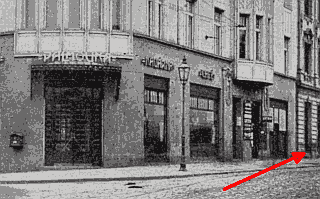
The building that Exner had erected in 1909 and 1910 and where he lived from then on. The pub can be seen to the right.
,20.5.1910

,1896
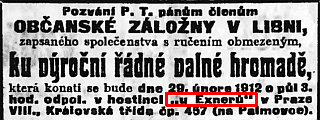
,23.2.1912
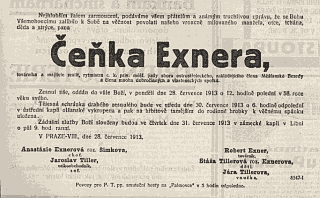
,29.7.1913
U Exnerů is mentioned by Švejk in an anecdote he tells in order to put the persistent money-lender in his place. The soldier tells the uninvited guest about some Boušek from Libeň who was thrown out from this pub repeatedly but still came back time after time.
Background
U Exnerů was a restaurant that existed at least until 1939. It was located on the corner of Primátorská and Královská třída in Libeň. In the address books from 1896, 1907 and 1910 it is listed under the name Na Palmovce.
U Exnerů was also been used for organised meetings and events; in 1915 it is mentioned in the newspaper in connection with charities, for instance for poor children. It existed under the name U Exnerů at least until 1940. Today it is a Chinese restaurant.
Čeněk Exner
U Exnerů was named after local entrepreneur and owner of the property Čeněk Exner (10 July 1855 - 28 July 1913). The owner of the property never managed the restaurant, the pub landlord in 1910 was Karel Klapa. Exner, born in Vrchlabí in the Krkonoše mountains, was the proprietor of a meat company (smoked meat) and owned real estate. In 1890 he founded the enterprise in Karlín and moved it to Libeň in 1897. He was married to Anastazie, had two children and also grandchildren. He was also active in Sokol and other organisations
From 1897 to 1910 the family lived in the same building as the pub and the firm, then they moved to number 890 next door. This was an Art Deco building that he had built in 1909 and 1910 as a wedding present to his daughter Anastazie. Exner suffered a tragic end to his life: newspaper notes reveal that he committed suicide in 1913 by hanging himself in the bathroom. The reason was supposedly financial problems.
Quote(s) from the novel
[I.13] „Poslušně hlásím, pane feldkurát,“ poznamenal Švejk, „že je to hotovej nezmar, jako nějakej Boušek z Libně. Vosumnáctkrát za večer ho vyhodili od ,Exnerů’, a vždycky se jim tam vrátil, že tam zapomněl fajfku.
Literature
- Adresář královského hlavního města Prahy a obcí sousedních (1910),
- Soupis pražských domovských příslušníků 1830-1910 (1920),
- Románové restaurační a jiné zábavní podniky, ,2009 - 2021
- Vycházka Libní,
- Zapsané firmy, ,13.1.1890
- Změny při firmách, ,2.1.1897
- Oběsil se v koupelně, ,20.11.1902
- Změny držebnosti, ,10.6.1908
- Novostavvby v nových Čtvrtích pražských, ,20.5.1910
- Oběsil se v koupelně, ,30.7.1913
- U Exnerů, ,...
 | Mariánská kongregace |  | ||||
| Praha II./1354, Ve Smečkách 32 | ||||||
| ||||||
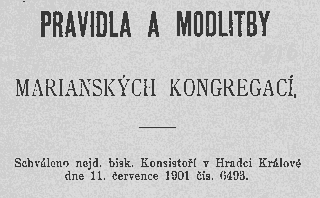
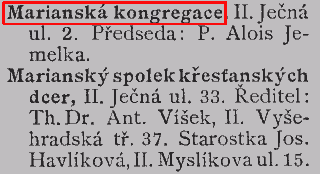
Adresář královského hlavního města Prahy, 1896
Mariánská kongregace is mentioned when Feldkurat Katz and Švejk are on the way to Vojenská nemocnice na Karlově náměstí to administer the last rites. In Vodičkova ulice a female custodian and member of the congregation runs after their horse cart to get blessed but complains how fast they ride.
Background
Mariánská kongregace (lat. Congregatio Mariana) is a Roman-Catholic educational institution, established by the Jesuit father Jean Leunis in 1563 and always associated with the Jesuit order.
The Prague section of the society was founded 28 April 1892. In 1896 the institution was located in Ječná ulice 505/2 (see kostel svátého Ignáce), with father Father Jemelka as chairman. In 1907 and 1910 the address was Ve Smečkách 1354/32, not far from Vodičkova ulice (where Feldkurat Katz and Švejk drove past in their horse cab). The building no longer exists and the site is used by Hotel Fenix.
Quote(s) from the novel
[I.13] A Švejk do toho zvonil, drožkář sekal bičem dozadu, ve Vodičkové ulici nějaká domovnice, členkyně mariánské kongregace, klusem dohnala drožku, dala si v jízdě požehnat, pokřižovala se, odplivla si poté: "Jedou s tím pánembohem jako všichni čerti! Člověk aby dostal souchotiny!" a vracela se udýchána na své staré místo.
Also written:Marianische KongregationdeCongregatio Marianala
Literature
 | K.u.k. Dragoner |  | |||
| Karlín/8, Za Invalidovnou - | |||||
| |||||

,4.9.1914
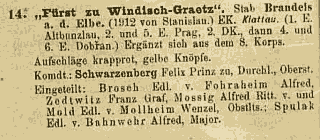
,1914

,1912
K.u.k. Dragoner is mentioned by Feldkurat Katz when he argues with the commander at Vojenská nemocnice na Karlově náměstí about compensation the cost of blessed oil and also travel expenses. The field chaplain argues that when an officer from the Dragoons go to a stud farm for a horse he is paid subsistence.
Background
K.u.k. Dragoner (Dragoons) was the term for some of the cavalry units in the Austrian part of the Dual Monarchy. In total there were 15 Dragoon regiments in k.u.k. Heer, mostly from the German- and Czech-speaking areas of the empire. The organisation of the cavalry in Austria-Hungary was quite complex - in addition to the Dragoons there were also Ulans and Hussars.
In The Good Soldier Švejk the reference is surely to a local Dragoon regiment, and such a regiment actually existed: Dragonerregiment Nr. 14. From 1912 the 2nd and 5th squadron were garrisoned in the barracks behind Invalidovna in Karlín (now U Sluncové 6). The staff was located at Brandys nad Labem, and the rest of the regiment in Stará Boleslav and Dobřany. The recruitment area was No. 8, see Korpskommando. The recruitment command itself was located in Klatovy.
Several Dragoon regiments were recruited from the district of 8. Korpskommando and over the years other regiments were located in Karlín. In 1906 Dragonerregiment Nr. 13 occupied the same premises behind Invalidovna as Dragonerregiment Nr. 14 did from 1912.
Quote(s) from the novel
[I.13] Potom následoval spor s velitelem nemocnice a polním kurátem, přičemž polní kurát několikrát udeřil pěstí do stolu a vyjádřil se: "Nemyslete si, pane hejtmane, že je poslední pomazání zadarmo. Když důstojník od dragounů je komandýrován do hřebčince za koňma, tak se mu také platí diety. Opravdu lituji, že se ti dva posledního pomazání nedočkali. Bylo by to o padesát korun dražší."
Also written:DragoonsenDragounyczDragonarno
Literature
- Z kruhů vojenských, ,7.4.1912
 | K.u.k. Generalstab |  | |||
| Wien I., Stubenring 1 | |||||
| |||||
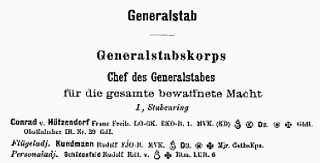
, 1914
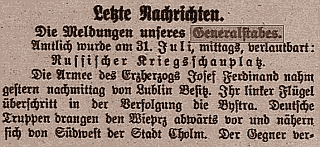
,5.8.1915
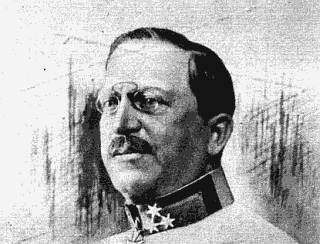
General Arthur Arz
,11.3.1917
K.u.k. Generalstab is mentioned in a conversation at Vojenská nemocnice na Karlově náměstí where a soldier relates about a clerical member of parliament who before the war talk about God and his love for peace and harmony between humans. After the outbreak of war the tone however changed, and now he talked about God as if he was Chief of General Staff.
The General Staff is mentioned again through the pondering of Oberleutnant Lukáš when he is on the disastrous walk with Max, and also during Kadett Biegler's dream on the train to Budapest. A painting of Chief of Staff Feldmarschall Conrad decorates the wall at k.u.k. Gottes Hauptquartier.
Background
K.u.k. Generalstab (Royal and Imperial General Staff) was an institution that in times of war or times of a threatening war was responsible for planning, execution and supervision of military operations. General Staff formally belonged to k.u.k. Kriegsministerium and was located in the same building.
The Royal and Imperial General Staff existed from 1867 to 1918 but the institution was already in place long before Ausgleich split the Habsburg empire into two parts of equal standing.
Chief of staff from 1912 to 1917 was Feldmarschall Conrad. He was demoted by the new emperor Karl I. and replaced by infantry general Arthur Arz von Straußenburg who was to become the last ever Chief of Staff at k.u.k. Generalstab (picture to the right).
General staff officers were permanently present at major military units; at district, divisional and brigade level.
Quote(s) from the novel
[I.13] A vida ho, vola, jakmile vypukla válka, ve všech kostelích se modlí za zdar zbraní a o pánubohu se mluví jako o nějakém náčelníkovi jenerálního štábu, který tu vojnu řídí a diriguje. Z téhle vojenské nemocnice už jsem viděl pohřbů, a uříznutých noh a ruk vozí odtud vozy.
[I.15] Zatraceně, proč ministerstvo vojenství dává takové věci do školního programu. To je přece pro dělostřelectvo. A jsou přece mapy jenerálního štábu.
[III.1] Uprostřed pokoje, ve kterém po stěnách visely podobizny Františka Josefa a Viléma, následníka trůnu Karla Františka Josefa, generála Viktora Dankla, arcivévody Bedřicha a šéfa generálního štábu Konráda z Hötzendorfu, stál pán bůh.
Also written:Royal and Imperial General StaffenC.a k. generální štábcz
Literature



|
I. In the rear |
 | |
13. Švejk goes to provide the last rites | |||
| © 2008 - 2024 Jomar Hønsi | Last updated: 22.10.2024 |


